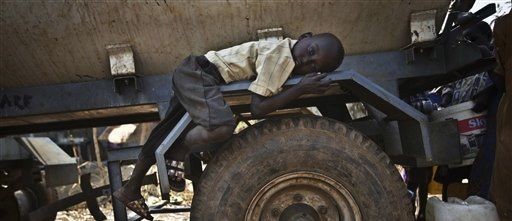Trade is paralyzed in South Sudan’s contested Unity State since loyalists of ex-vice president Riek Machar seized power in the state, causing oil workers and foreign traders to flee.
Many of the truck drivers, shop owners, food importers, and other wholesalers and retailers in Unity State are from neighboring Sudan. Initial clashes affected markets in the capital Bentiu and its sister city Rubkona.
As the violence spread into outlying areas, yet more businessmen fled and more markets were looted. Recent and ongoing fighting has affected most heavily two counties, Pariang and Mayom, where many soldiers remained loyal to President Kiir in spite of the change of power in Bentiu.
Overall at least 1,500 Sudanese traders have been affected, one businessman told Radio Tamazuj today.
Arob Turuk, the commissioner of Abiemnhom County, says that he was visiting neighboring Mayom County when fighting first broke out there. He ordered businessmen there to be transferred to safety in his county.
“On the same date when there was fighting in Mayom County, I was there. Most of the Sudanese traders ran to mosques to hide,” he said in an interview Tuesday with Radio Tamazuj.
“I asked the military officers to transfer them to Abiemnhom County and in fact the 165 tradesmen reached Abiemnhom and some decided to proceed from there to their brothers in Wau, Aweil, Kwajok and other different part of the country. And those who remain here are those who decided to back to northern Sudan,” the commissioner explained.
Abiemnhom, which lies to the north of Mayom and near the border with Sudan, also borders Warrap State to the west, which is still in government hands. As such it has served as an escape route for fleeing civilians.
Ahmed Mohamed Abdelrahman, a trader now in Abiemnom, says that there were about 1,500 traders from different part of Sudan, such as Darfur and the Nuba Mountains, who were working in Unity State and “have lost all their belongings and are now so confused as to what to do.”
“The whole Mayom market where most of them were having their shops was burned on 27 December due to outbreak of clashes. Those who managed to reached Abiemnhom are 280 persons but the rest we don’t know where they are,” he said.
Abdelrahman himself claims to have lost about 97,000 pounds in cash.
Many ordinary citizens also fled to Abiemnhom and then beyond, according to the commissioner of the county. “We are trying to help IDPs who are currently settling with us with the few things that we have.”
“We are receiving a number of people every day though some are proceeding to other areas as people know that Abiemnhom is one of the rebels’ targets,” said Turuk.
The commissioner described the current situation in the county as calm but noted that it will come under threat if loyal forces in Mayom are overrun: “Our security situation depends on the situation in Mayom because any attack on Mayom will definitely extend to us here.”
“My message is that the government will soon put an end to the current crises either through negotiation or by other means and the situation will return to normal,” he stated.
4th Division territory
In parts of Unity State no longer under the control of the national government, economic disruptions are equally severe.
The spokesman of the interim government in Bentiu has acknowledged that commerce with the rest of the country has been discontinued.
Few if any international NGOs continue to operate in Bentiu, and authorities in the state capital appear to have placed World Food Programme stocks under their custody.
Commercial flights to Rubkona airstrip have been cancelled by civil aviation authorities in Juba, and it is not clear whether UN Humanitarian Air Service flights are also suspended.
Photo: A boy displaced by violence at the UN House compound in Juba (AP/Ben Curtis)
Related coverage: Traders in South Sudan complain of huge losses (1 Jan.)




